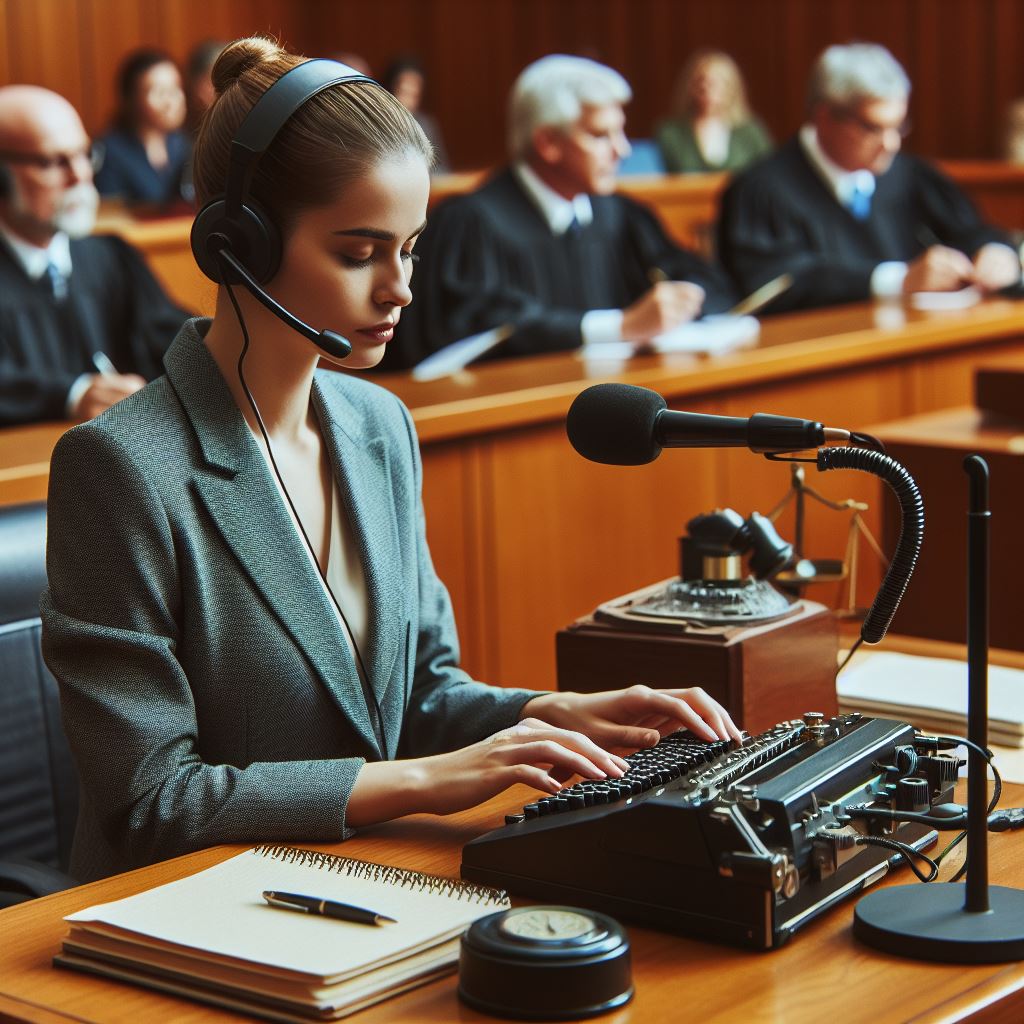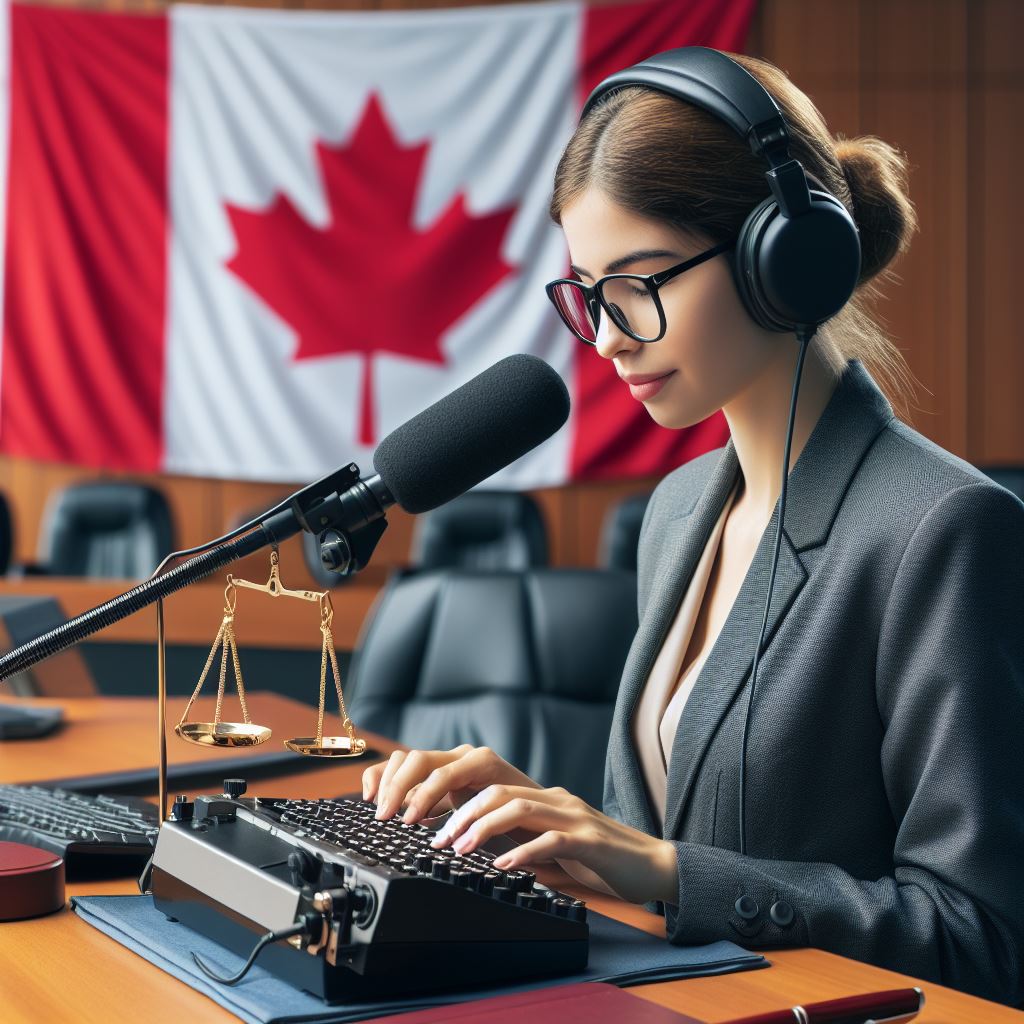Introduction
In the legal system, court reporters play a crucial role by providing accurate and reliable transcriptions of court proceedings.
Court reporting is a profession that requires exceptional skills and attention to detail.
Court reporters are responsible for creating verbatim records of speeches, testimonies, and arguments.
These records serve as an official record of the proceedings and are essential for legal proceedings, appeals, and research.
The importance of court reporters cannot be overstated. Their work ensures that all statements made during trials and hearings are captured accurately, preventing any misinterpretation or misrepresentation.
This accuracy is especially vital in cases where people’s lives and livelihoods are at stake.
To successfully carry out their duties, court reporters must possess specific skills.
Firstly, they must have exceptional listening and concentration abilities to accurately capture every spoken word.
Additionally, they need excellent typing skills and must be able to work quickly and efficiently to keep up with the pace of verbal exchanges in the courtroom.
Furthermore, court reporters must have a comprehensive understanding of legal terminology and procedures to accurately transcribe complex legal arguments.
They must also remain neutral and unbiased throughout the proceedings, maintaining professionalism and integrity at all times.
In short, court reporters are essential to the legal system. Their skills in accurately documenting court proceedings ensure the integrity and fairness of the legal process.
By skillfully transcribing every spoken word, court reporters contribute to justice and uphold the principles of transparency and accountability.
The role of court reporting is indispensable, and the skills required for this profession are demanding but essential to maintaining the integrity of the legal system.
Essential Skills for Court Reporters
Court reporting is a challenging and demanding profession that requires a unique set of skills and abilities.
The skills every court reporter needs can be categorized into three main areas: listening and concentration skills, typing and stenography skills, and language and grammar skills.
One of the most crucial skills for court reporters is excellent listening and concentration skills.
In a courtroom setting, there are often multiple conversations happening simultaneously, making it essential for court reporters to decipher and capture all the information accurately.
This skill requires intense focus and the ability to pay attention to every word being spoken.
In addition to listening and concentration skills, court reporters must also have exceptional typing and stenography skills.
They need to be proficient in using stenotype machines or computer-aided transcription (CAT) software.
These tools allow court reporters to transcribe spoken words into written form efficiently.
Court reporters also need to have a high typing speed to keep up with the fast-paced nature of court proceedings, all while maintaining accuracy.
Furthermore, court reporters must possess impeccable language and grammar skills.
They need to have a strong command over the English language to accurately transcribe conversations and produce error-free transcripts.
Unlock Your Career Potential
Visualize a clear path to success with our tailored Career Consulting service. Personalized insights in just 1-3 days.
Get StartedAdditionally, court reporters need to be familiar with legal terminology and jargon, as court proceedings often involve specialized terms and terminology specific to the legal field.
Having these essential skills is crucial for court reporters to excel in their profession.
A court reporter’s accuracy and ability to capture every word spoken accurately can greatly impact the outcome of a legal case.
Furthermore, their expertise in using stenography equipment or CAT software can significantly enhance their efficiency and productivity.
Without excellent listening and concentration skills, court reporters may miss important details and compromise the accuracy of their transcripts.
Similarly, inadequate typing and stenography skills can lead to delays and errors in the transcription process.
Finally, lacking language and grammar skills may result in transcripts that are difficult to read, comprehend, or use as legal evidence.
In general, court reporters require a diverse range of skills to succeed in their profession.
Excellent listening and concentration skills, exceptional typing and stenography skills, as well as impeccable language and grammar skills are essential for court reporters to accurately transcribe court proceedings.
Developing and honing these skills is crucial for aspiring court reporters to thrive in this challenging yet rewarding career.
Read: Continuing Education for Legal Assistants
Knowledge of Legal Proceedings
Being a court reporter requires a set of skills that go beyond simply typing quickly and accurately.
To excel in this profession, one must possess a deep knowledge of legal proceedings and a strong command of legal terminology.
Additionally, familiarity with legal documents is crucial for accurately capturing information presented in court filings.
Let’s delve into these essential skills in more detail.
Understanding of Courtroom Etiquette
Courtroom etiquette is of utmost importance for court reporters.
They must be familiar with the decorum and procedures followed in a courtroom setting.
This includes knowing where to sit, when to stand, and how to address the judge, attorneys, and witnesses respectfully.
Additionally, court reporters must adhere to ethical standards by maintaining confidentiality and impartiality throughout the proceedings.
Knowledge of Legal Terminology
Court reporters need to have a thorough understanding of legal terms and phrases commonly used in court.
This knowledge enables them to accurately transcribe discussions and testimonies involving complex legal concepts.
Whether it’s deciphering specialized terminology in a medical malpractice case or understanding statutory language, a court reporter’s command of legal terminology is essential for producing accurate and comprehensive transcripts.
Familiarity with Legal Documents
Court reporters often come across various legal documents, such as pleadings, motions, and contracts.
Proficiency in reading and interpreting these documents is crucial for accurately capturing information during court proceedings.
By understanding the content and context of these legal documents, court reporters can ensure the accuracy of their transcripts and provide valuable context to attorneys, judges, and future readers of the transcripts.
In fact, court reporters play a vital role in the legal system, and acquiring the necessary skills is essential for excelling in this profession.
From understanding courtroom etiquette to having a firm grasp of legal terminology and documents, court reporters must continuously develop and refine their knowledge to produce accurate and comprehensive transcripts.
By doing so, they contribute to the smooth functioning of legal proceedings and the administration of justice.
Read: Crafting the Perfect Legal Assistant Resume

Gain More Insights: Educational Paths for Aspiring Legal Assistants
Interpersonal and Communication Skills
Effective Nonverbal Communication
- Maintaining a neutral facial expression and body language during court proceedings.
- Using non-disruptive gesturing to clarify understanding.
Collaborative Approach
- Coordinating with judges, attorneys, and witnesses to ensure accurate transcription.
- Engaging in active listening and seeking clarification when necessary.
Confidence and Professionalism
- Demonstrating a calm and composed demeanor while under pressure.
- Ability to objectively handle sensitive or emotional testimonies.
Read: A Day in the Life of a Canadian Court Reporter
Technological Proficiency
In order to excel as a court reporter, it is essential to possess various skills, including technological proficiency.
The ability to effectively utilize technology can greatly enhance the accuracy and efficiency of court reporting.
Here are some technological skills that every court reporter needs:
Proficient in Stenography or Voice Writing
- Mastery of stenotype machines and relevant software is crucial for accurate and real-time capturing of court proceedings.
- Being adept at capturing spoken words using voice recognition technology ensures precise transcription.
Familiarity with CAT Software
- Knowledge of popular CAT software programs enables efficient organization and management of court transcripts.
- The ability to effectively utilize software features like macros and shortcuts enhances transcription speed and consistency.
Familiarity with Audio and Video Recording Equipment
- Proficiency in operating recording devices is essential for capturing court proceedings accurately.
- Understanding audio/video synchronization methods ensures accurate transcription and synchronization of recorded materials.
Technological proficiency is crucial for a court reporter to excel in their profession.
The skills mentioned above equip court reporters with the necessary tools to perform their duties efficiently and accurately.
Read: How to Become a Court Reporter in Canada
Conclusion
Court reporters demand precision, speed, and meticulous attention to detail. Their accuracy ensures an unbiased record of legal proceedings.
These skills, vital in a dynamic legal sphere, require constant refinement.
Aspiring court reporters must proactively pursue and perfect these abilities, as they form the backbone of a successful career.
The evolving nature of the legal landscape demands adaptability, making continuous skill development indispensable.
Whether transcribing verbal exchanges or capturing nuances, an active commitment to honing these competencies ensures not just competence but excellence.
In essence, the indispensable traits of a court reporter extend beyond the courtroom, shaping a narrative of reliability and professionalism in the legal arena.
As the legal tapestry unfolds, those equipped with these skills stand as pillars of justice, capturing every word with unwavering precision.




